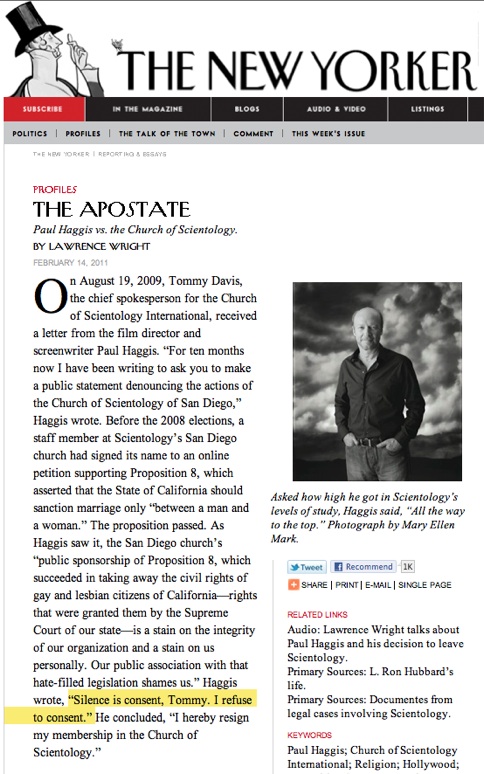Writing in The New Yorker, Lawrence Wright gives a comprehensive and illuminating account of the cult known as the Church of Scientology. His article is a follow-up the controversy surrounding writer/film director Paul Haggis’s public defection after 35 years as a Scientologist.
I quoted Haggis’s resignation letter with its core message: ‘Silence is consent … I refuse to consent‘ in an early post here on thePaepae.com.
It’s one of my themes — the need to speak up about wrongdoing… which Hubbard’s very own philosophy expounds (see below).
Wright’s carefully written article (as you do) is REALLY worth reading … it’s long, so if you can’t make the time now, archive it for later when you do. It’s a must-read. Some highlights:
‘Hubbard says that there is a relationship between knowledge, responsibility, and control, and as soon as you know something you have a responsibility to act. And, if you don’t, shame on you.’ [Comment: See?]
…
In October, 2009, Marty Rathbun called Haggis and asked if he could publish the resignation letter on his blog. Rathbun had become an informal spokesperson for defectors who believed that the church had broken away from Hubbard’s original teachings. Haggis was in Pittsburgh, shooting his picture. “You’re a journalist, you don’t need my permission,” Haggis said….
…
When Haggis first turned to Scientology, he considered himself an atheist. Scientology seemed to him less a religion than a set of useful principles for living. He mentioned the ARC Triangle; “ARC” stands for “Affinity, Reality, and Communication.” Affinity, in this formulation, means the emotional response that partners have toward each other; reality is the area of common agreement. Together, these contribute to the flow of communication. “The three parts together equal understanding,” Haggis said. “If you’re having a disagreement with someone, your affinity drops quickly. Your mutual reality is shattered. Your communication becomes more halted. You begin to talk over each other. There’s less and less understanding. But all you need to do is to raise one part of the triangle and you increase the others as well. I still use that.” [Comment: Yes, so do I, but fortunately, I didn’t have to join a cult to learn it!]
…
I once asked Haggis about the future of his relationship with Scientology. “These people have long memories,” he told me. “My bet is that, within two years, you’re going to read something about me in a scandal that looks like it has nothing to do with the church.” He thought for a moment, then said, “I was in a cult for thirty-four years. Everyone else could see it. I don’t know why I couldn’t.”
Wright’s article exposes what I can only interpret as corrupt and bullying practices within the ‘Church’ (hardly a novelty for an organised religion, I’m sorry to say). The [alleged] forgeries and misuse of legal process (sworn statements etc) are eye-opening.
Personally, I found the hectoring and threatening tactics the Scientologists use reminiscent of Matthew Gilligan’s response to online discussion about the marketing methods used to sell his Sponge Bay and Perriam Cove subdivisions … discussion since expunged (ex-Sponged?) from the internet.
Seriously, read it at The New Yorker. Fine work.


